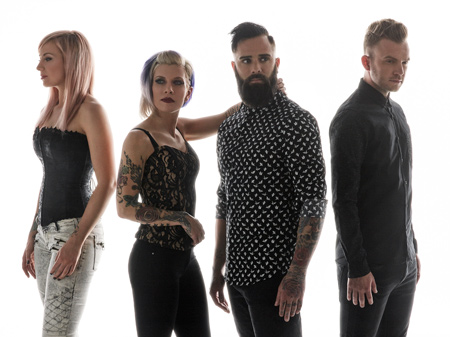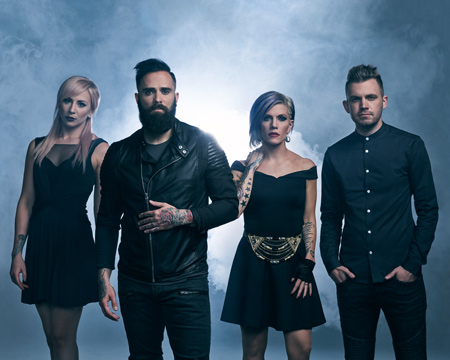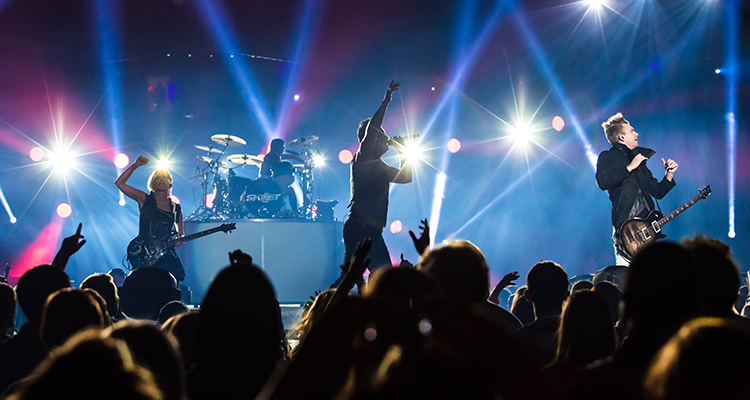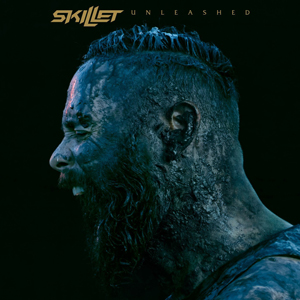Taking in an all-out, in-your-face rock star giant like Skillet lead singer-bassist John Cooper, especially now after millions of albums sold, numerous Dove, GRAMMY, and Billboard Award nominations (and wins), and getting to front one of the most successful touring bands in recent history alongside your beloved wife, one could assume that he might enjoy basking in the pyro glow of so many flash pots.
Take a little time to talk with him one-on-one, and you quickly realize that he’s probably most comfortable being more of a John Doe. The refreshingly unassuming Cooper, however, is very comfortable in his own skin, and this is reflected in the music…and his attitude toward making it. “These are the songs that I want to write, and the songs that I really believe in,” said Cooper, whose devout faith and lifelong love of Christian music provides the backbone of his work.
Amid Skillet’s ongoing torrent of domestic and international touring, we had the honor of sitting down with Cooper to catch up with the front man. With the rise of their popularity now crossing multiple formats, including an ever-increasing following of fans considered to be outside of the church, we dig a little deeper with him into the process and mindset of making a Skillet album these days, and the risk-reward of following your heart—not a formula—from the studio to the stage.
CCM Magazine: Your last record, Rise (buy), was another legacy in a long line of career-defining albums—but you guys began writing for Unleashed (buy) even as that was being released, correct?
John Cooper: Yes, Korey [Cooper] and I started writing right away after Rise came out. I don’t really remember exactly why. I was just feeling inspired by listening to music and enjoying writing. It’s nice whenever a record comes out because if you’re writing, you’re not turning songs in—that’s when things get stressful. When you turn in songs to the label, people begin listening, and then everyone starts saying, “Hey try this, or try that—no, I don’t like this. I like this, but not that…” Korey and I were just writing what was in our hearts, even if it was silly, in fact, even if it didn’t feel like a “Skillet song.”
It was fun and I think for me, was the excitement that this record turned into and why we called it “Unleashed.” It just felt that we were making a record that we really wanted to make and we didn’t have as many people telling us what to do and getting their hands involved in it—it’s just a really fun record to listen to.
I’m always messing with ideas—even now that this record is out. I always have a few ideas that are going on in my head, but as a rule, I don’t do anything with them before a record comes out. You need to take a break. But when we hit the road, we’ll start writing right away.
CCM: Where was the band’s head-space going from Rise to Unleashed?
JC: The things I liked the most AND the least about Rise was that it was lyrically very heavy. It wasn’t dark, but it was definitely somber. There were a lot of terrible things happening in the world—still are, and getting worse—and as I was writing that record, I really felt like I wanted to have a voice into what was going on in the world. But what I started noticing as the record was coming out, was that it wasn’t an album that I could listen to all the time because it did make me feel heavy. I couldn’t put it on and go for a run because it was too much to think about.
When I started writing for Unleashed I thought, “I don’t always have to write songs like that—I can write songs that are fun.” “Feel Invincible” is a song like that, a really simple way to say what I wanted to say—it felt like a song that would be played at the Super Bowl or Olympics. It was just a really simple song for me to like.

photo: Joseph Cultice
CCM: You’ve mentioned that you enjoy getting into albums that are, in your words, “party albums.” Can you give some examples?
JC: When I say, “a party to listen to,” what I mean are records that guys want to work out to. Like, gosh… P.O.D.’s Satellite (buy). That was just a great record. Turn it on—it isn’t something you have to think a lot about. Trying to think of other records that are like that…you know, “work out albums”…Metallica’s “black” album (buy) is like that, too.
CCM: I’ve got a few tunes on my workout playlist from that album, so I definitely agree…
JC: Yeah, great album to work out to, for sure.
CCM: You recently mentioned that music is what “brings people together.” In your opinion, how can your most recent work help to accomplish this?
JC: The world is in a very shaky time—and not just because of ISIS and some of those violent things—even here in America with all of the cop shootings, Black Lives Matter movement, the unsettledness of the election and the economy…there’s so many scary things right now that are vying for our attention. There’s two ways that we could have gone about it: calling out the problems that you see and making people aware of it, or—the way we went on Unleashed—which was making a record that’s more of an escape from what is happening. We all know it’s happening. I don’t really know if I’m bringing it to people’s attention by talking about it. So, we made an album that hopefully people can have a good time listening to.
A Skillet crowd is not just made up of Christian people who want to worship God more, or want to find out more about Jesus… It’s made up of a lot of Christians, yes, but also lots of atheists—all sorts of religions, and all sorts of ages. You go to a Skillet show, it’s ages five to sixty-five! It’s really strange, because we’ve been around for so long. [Our music] brings people together because of the nature of the songs—they’re fun to sing and they’re fun to rock-out to. A great thing about music is sometimes the songs are open to different interpretations, and I really like that.
We’ve been playing and talking about “Feel Invincible” a lot on the radio lately, and general market stations will ask, “Hey, so what’s that song about?” It’s cool because I get a chance to say, “It’s a song about finding that one thing in your life that gives you hope and gives you a reason to wake up tomorrow morning—for lots of people, that’s a lot of different things. For me, it’s my faith in Jesus and that is the reason that I can face what’s happening in the world.” But it’s okay if people listen to it, and interpret it to be about their girlfriend, husband, or what ever.
CCM: So, bringing up that age-old question since we started calling all of this music “contemporary Christian”—does carrying the label “Christian band” give you an unfair disadvantage, and does that really matter one way, or another?
JC: When I go into a rock station and they ask, “Now, we hear that you guys are a ‘Christian band,’ is that really true?” Or, sometimes they even ask, “Hey, people always say that ‘Christian music is really bad,’ do you agree with that?” What I want to say is, “Hey, hey, hey, we’re a rock band—don’t judge us wrongly because there’s a particular label.” Everyone is expecting you to come out and say some type of trigger-word on a particular topic, so I’m always very up front about [calling Skillet] a “Christian band.” I am proud of Christian music, I grew up listening to it, and I love it. Of course, I’m very proud of my faith, in general, so there’s no denying it. I always answer, “Absolutely. Yes, we are a ‘Christian band.’”
There’s a group of people out there who think that Christian music is “no good.” It’s not fair, and people ask me that in interviews a lot. I always defend Christian music because the truth is there are so many awesome Christian musicians—even in the world of mainstream music there are a lot of musicians that were in Christian bands, or are Christian bands, like Switchfoot. So, it’s a little bit of that tightrope you have to walk, but most of our Christian fans like to see us remember where we came from, and I could never forget that anyway.
CCM: Is Unleashed is a body of work that can help to break down those stereotypes?
JC: As I already said, yes, we’re a “Christian band.” I don’t mind being called that because…I like that! Hopefully, everything I do belongs to the Lord and is redeemed, but I don’t think what makes a “Christian act” is necessarily judged by every single song they [record or perform]. These days, we are judged by YouTube, what we say in interviews and on stage, what I say on my website, what I tweet… It’s who we are, rather than every song we sing.

photo: Andrew Fore
Ultimately, yes, I do hope that Unleashed could be a bridge between those worlds. Our record Awake (buy) was that way. We had some songs on there that some Christians didn’t really like, but to tell you the truth, I liked the message of them. For us, if every song is overtly “Christian,” “worship,” too “Jesus,” or always about Jesus, I think by that point we’re only singing to Christians—there’s nothing wrong that, and I’m glad that some people do that—it’s just not what I want to do.
CCM: Staying on that theme, do you consider it risky to record songs like “I Want To Live” with lyrics such as, I want to live my life / The way I want to live, which, from a contemporary Christian perspective, could leave things too open for interpretation?
JC: I will say, sometimes people think some of my songs aren’t overlaying with what the Bible says, which is absolutely not the case—it’s just a matter of point of view. “I Want To Live” is a really good example. It can have lots of different meanings when it says, I’m free to start again / The way I want to live. Now, you can get into a pretty circular theological discussion around, “Maybe that’s the reason I want to [live my life the way I want to live] because the Holy Spirit has drawn me to do that, because God chose me…” and that’s fine, because the Bible does say that.
So, to me, [as a Bible-believing Christian, that song contains] a very spiritual message—but the inspiration for it actually came from a different place. After talking with some fans from Russia, one of them had written us a note that said, “I don’t have anything to live for, but your music gives me hope and helps me want to live.” I thought, “You know what, that’s a really cool message, even if it’s not specifically talking about Jesus.”
Sometimes there are just situations in life when people don’t know if they want to keep on living or want to fight for another day, and they just have to make a decision to go for it. Even if—literally—that’s all that it is, I still think that’s a message worth singing about, regardless if it’s not considered “religious.” Is it risky? I think it’s more about asking, “What do I feel like God is saying to me?” I don’t necessarily think of it as a matter of risk.
CCM: Going back to what you said earlier, about being judged for who you really are versus lyrical content alone… At the end of the day—and after so many people have been observing and interacting with you on social media, etc.—isn’t it the Christ in you what it’s really supposed to all be about, anyway?
JC: I do think that we’re in different times. I think for years, Christian music wanted to “be in the mainstream”—and I think most people that grew up with Christian music always wished that their friends would listen to it, or at least give it a chance. Any time anyone ever came over to my house, I was always like, “You’ve got to hear Petra!” because I desperately wanted them to believe that Christian music was cool, and I believed that [eventually] their message would get to my friends.
Not to point fingers, but some people in the “Christian world”… they want that, but they think that we can just make it happen without having to sing about real life issues. Not to say that worshipping God isn’t real life, it is, but it’s not [a way of life] for a lot of people. So, I think, “Hey, there’s nothing wrong with singing about love or even singing about being angry”…that was one of my songs on Awake that people were upset about, a song called, “It’s Not Me.” It was kind-of an angry song, but I was like, “What’s wrong with that, you know, a lot of people feel that way…” This song could be to the devil, if you really wanted it to be…it could be about drugs or an abusive situation at home…there’s nothing wrong with [singing about] that—it’s real life stories, here. So, yeah, we’re in a little bit of a different time now.
Some people have said, “Skillet doesn’t sing about spiritual things anymore,” and…I mean, I don’t really care what they say all that much… “Stars” [from Unleashed] is a straight up worship song. It’s the most overtly “worship” song we’ve done in like, twelve or thirteen years. [Conversely] we could get flack from the mainstream side saying, “What is this ‘worship’ stuff…it’s so obviously talking about God…” But, again, that’s also part of what I want to do is say, “Hey, I don’t care if the ‘mainstream world’ thinks it’s ‘cheesy’ or ‘too Christian,’ or whatever.” It doesn’t really matter what they think. This is my album, and I’m “unleashed!”

photo: Joseph Cultice
CCM: What was it about Seth Mosley that allowed you two to click, and what was the recording process like with him?
JC: We had a great time. I think everyone that works with Mosley pretty much says the same thing, which is, “He’s just really easy to work with—one of the easiest people out there.” He just flows with stuff, and he’s got great ideas. I found myself being at my best when we worked together. It was a really great experience, and I would assume that [our] stuff is probably some of the heaviest he’s worked on… Heavy guitars, but the songs turned out to be very catchy and fun.
Brian Howes produced the bulk of the record. He’s not produced anything since our Comatose (buy) album. Long story short… After Comatose, Brian had gotten signed to a label deal and he was disqualified from producing outside tracks, so we couldn’t work with him and that’s why we went to Howard Benson on Awake and Rise. Then, Brian’s deal came up, he was open, and I was really happy to join up with him again. I have a real soft spot for our Comatose record, and it was just really exciting to be able to do another project again. This is actually the first record we’ve ever done where we’ve had multiple producers.
CCM: Would you do that again?
JC: Absolutely. The industry has changed so much because music is just so niched out. Everybody does a “thing.” We also worked with a producer named Kevin Churko that did two songs on this record. Kevin is most known for Ozzy Osbourne, Five Finger Death Punch—modern metal—and I’m a huge fan. I got his number from a friend in Papa Roach, so I just called him and introduced myself. I think he was a little surprised because he was like, “Man, I’m really happy to do something that’s not just metal…” He was happy, I was happy, and I just loved working with him.
I think these days it’s good to get some other influences with people that specialize in different kinds of sounds, especially with having Seth Mosley in the mix, that was a big deal because, truthfully, Christian music is very different than mainstream music and the way that the lyrics are crafted is a different process. I don’t know how many lines I wrote when Seth would say, “Oh, you can’t use that word on Christian radio.” What do you mean I can’t use that word?! It wasn’t like it was a bad word, but he would just be like, “They just don’t like that word,” and I’m like, “This is so specific…and the way you [have to] say it is so specific!” So, it’s good to have people around you that know that kind of thing, because I don’t.

 Listen Live
Listen Live

I think the CCM Industry today are so close minded IMO which is why I find myself listening to my cd’s, youtube, or spotify now days bc all you hear on the radio is the same song being played 10xs a day. Don’t get me wrong I like a lot of the songs and I like Tobymac’s songs, but do I have to hear Tobymac half dozen times on the radio along w a few other artists all in one day? There are so many other great artists out there that very seldom get played for whatever reasons. And also does every group have to become another Hillsong artist? Like Winter Jam as much as I have enjoyed seeing the artists and going to Winter Jam 5xs now can we please get some new groups on the tour please at least for the East coast ex: Seventh Day Slumber, Disciple, Lacey Sturm, Jaci Velasquez, Manafest, Switchfoot, etc..do I need to go on? Seriously CCM you can do better then this! Therefore I can completely understand how John feels about the industry and how sometimes they can be so legalistic w too many freaking rules that an artist has to follow in order to get their songs played on Christian radio. CCM needs a breath of fresh air and to be more open minded to things outside of the norm. It’s starting to become real boring listening to this genre. Same old same old…Aside from that I love Skillet and love the honesty of this band.